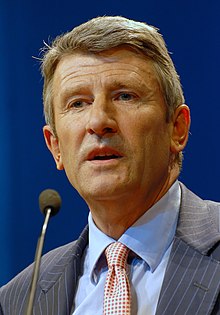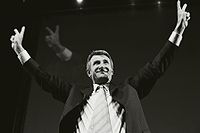This is an old revision of this page, as edited by Timrollpickering (talk | contribs) at 14:57, 13 June 2010 (Filling in 2 references using Reflinks). The present address (URL) is a permanent link to this revision, which may differ significantly from the current revision.
Revision as of 14:57, 13 June 2010 by Timrollpickering (talk | contribs) (Filling in 2 references using Reflinks)(diff) ← Previous revision | Latest revision (diff) | Newer revision → (diff)| Philippe de Villiers | |
|---|---|
 | |
| Member of the European Parliament for France | |
| Incumbent | |
| Assumed office 1994 | |
| Personal details | |
| Born | March 25, 1949 |
| Nationality | |
| Political party | Movement for France |
Viscount Philippe Le Jolis de Villiers de Saintignon, known as Philippe de Villiers, born on March 25, 1949) is a French politician. He was the Mouvement pour la France nominee for the French presidential election of 2007. He received 2.23% of the vote, putting him in sixth place. As only the top two candidates advance to the second round of voting, he was eliminated from the race. Before and after the election, Villiers has been internationally notable for his criticism of Islam in France.
Personal life
Villiers was born in Boulogne in the département of Vendée, France. He received a Master's Degree in law in 1971, graduated from the Paris Institute of Political Studies in 1973, and graduated from the National School of Administration in 1978. After university, Villiers became a successful entrepreneur. He created Puy du Fou, one of the most visited themeparks in France, as a living showcase for its history. The themepark includes a replica medieval city with the 'Gallo-Roman Stadium', a coliseum designed by Villiers to stoke patriotic feeling by recreating Gallic rebellions against Imperial Rome.
He is a French aristocrat and a descendant of Prime Minister and Regent Philippe II, duc d'Orléans. As of 2007 he is a Member of the European Parliament (Independence/Democracy Group). He is 1.85 meters tall.
Political career
Early career

From 1976 to 1978, Villiers served as a top civil servant in the Chirac administration. In 1981, he resigned his post as sub-prefect because he did not want to serve the government of the Socialist President François Mitterrand. In 1986-1987, he briefly served as a junior Minister for Culture (Secrétaire d'État auprès du Ministre de la Culture) in the second government of Jacques Chirac, under Minister Francois Leotard. His appointment was initially viewed badly by Libération and several other press agencies, which referred to his "ambiguous personality". However, Villers supported Leotard's mixed, non-ideological policy towards French culture.
In 1987, he was elected into local office as a member in Valéry Giscard d'Estaing's Republican Party. He became a rising start within the Union for French Democracy. During the public debate over the Maastricht Treaty, which established the European Union, in 1992, he achieved lasting prominence in the media as an anti-Treaty activist. This set him apart from most prominent members of the mainstream political right. The French people narrowly ratified the Treaty in September 1992.
Villiers led an anti-European integration list in 1994 receiving about 12 percent of the votes, placing it in third place behind the Gaullists and the Socialists. Villiers centered the campaign on opposition to the European Union along with a call to eliminate corruption in government. In November 1994, Villers left the Republican Party to form Movement for France. He ran for President of France in 1995 and received about 5 percent of the vote.
Recent career and 2007 presidential bid
Once a member of the Union for French Democracy political party, he now leads a party called the Mouvement pour la France, which has enjoyed some success in elections for the European Parliament. The party's share of the vote in the European Parliament election, 2004 declined. Nevertheless, Villiers and two other members of his party were elected.
Villiers ran for the French presidency in 2007, and based his campaign on his opposition to what he sees as the rampant Islamisation of France. In May 2006, polls showed him enjoying the support of about 4% of the electorate, almost twice as high as he actually polled in the first round of the election. An "Ifop-Paris-Match" poll conducted on 12 October 2006 gave him his highest ever popularity rating, with 37% saying they "have an excellent or good opinion" of Villiers, and 28% saying they could vote for him in 2007. This was not borne out in the results of the first round of voting, with him receiving less than 3% of the popular vote.
Following the first round of the 2007 presidential election, he called on voters to vote for Union for a Popular Movement (UMP) candidate Nicolas Sarkozy to counter the Socialist Party's candidate Ségolène Royal and the left.
Positions
Criticism of Islam
Template:Muslims and controversies
Villiers is internationally notable for his criticism of Islam in France. He has stated that "I am the only politician who tells the French the truth about the Islamization of France" and that "I do not think Islam is compatible with the French republic". Villiers advocates an end to all mosque construction, banning all Islamist organizations suspected of links to terrorism, and expelling extremist individuals from France.
Villiers published Les mosquées de Roissy: nouvelles révélations sur l'islamisation en France (The Mosques of Roissy: New Revelations about Islamization in France) in 2006. He alleged that, using internal documents from whistleblowers, the Muslim Brotherhood infiltrated security personnel at Charles de Gaulle Airport in Paris. The book led to seventy-two employees having their clearances revoked. As well, makeshift Muslim prayer rooms were closed.
Villiers' views on Islam and Muslim immigrants have caused Der Spiegel, The Wall Street Journal, The Boston Globe, and The San Francisco Chronicle to label him "far right".
Political philosophy

Villiers is a nationalist, a traditionalist, and a leading eurosceptic. He has self-described as a "rooted conservative". During his tenure under François Léotard, he said that he shared Léotard's American-based "libertarian liberalism". In 1995, The Economist referred to him as "an ephemeral Catholic monarchist"
He advocates cutting taxes, expelling all illegal immigrants, and preventing Turkey from joining the EU. He is a vocal critic of the European Union's relationship with France, accusing it of "destroying their jobs, their security and their identity" and saying that "the Europe of Brussels is an anti-democratic dictatorship". He was a leader of the side advocating a 'No' vote in the 2005 French referendum of the European Constitution. The 'No' side won the vote, which the activists believed constituted a major victory for Euroscepticism in France. Villiers then launched a campaign to restore the franc, remarking that "Everybody notes today that the adoption of the euro was a technical success but its economic, political and human toll is incontestable."
Villiers opposes immigration into France in general, but he has advocated that "individual cases be treated with the greatest humanity." He also opposes expelling current immigrants residing in France or subjecting them to discrimination in housing, employment, or other spheres. Despite their differences on these and other issues, the National Front's Jean Marie Le Pen has remarked that Villiers' ideas were "lifted" from him and that their "votes should be added together".
Villiers coined the phrase "Polish Plumber" in a June 2005 political speech about the Bolkestein directive, referring to the perceived threat of cheap East European labour to French wages. The mythical figure became a central point of debate in France, and it later prompted an international controversy. He has also referred to the "Latvian mason" and the "Estonian gardener."
American author Harvey Gerald Simmons has compared the "Villiers phenomenon" to Ross Perot's support in the 1992 American Presidential election. He stated that Villiers has a populist, anti-establishment image that puts him on the edges of the mainstream political right of France rather than in the far right.
Support base
Villiers gathers his support from among practicing Roman Catholics, artisans, retired people, farmers, and small business owners.
Political career
Governmental function
Secretary of State for Communication : 1986-1987..
Electoral mandates
European Parliament
Member of European Parliament : 1994-1997 (Resignation, reelected in the parliamentary elections in 1997) / July-December 1999 (Resignation) / Since 2004. Elected in 1994, reelected in 1999, 2004, 2009.
National Assembly of France
Member of the National Assembly of France for Vendée : 1987-1994 (Became member of European Parliament in 1994) / 1997-2004 (Became member of European Parliament in 2004). Elected in 1987, reelected in 1988, 1993, 1997, 2002.
General Council
General councillor of Vendée : Since 1987. Reelected in 1988, 1994, 2001, 2008.
President of the General Council of Vendée : Since 1988. Reelected in 1992, 1994, 1998, 2001, 2004, 2008.
Political function
President of the Movement for France : 1994-1999 / Since 2000.
See also
References
- "Colourful viscount rallies 'no' vote: Julian Nundy watches Philippe de Villiers, a former minister, whip up anti-Maastricht feeling in Chartres - Europe, World". The Independent. 1992-09-12. Retrieved 2010-06-13.
- ^ Your MEPs:Philippe de VILLIERS. European Parliament:Main Website. Retrieved March 4, 2009.
- 2007 French Presidential Elections The Washington Post
- ^ France's Eurorebel 'with a cause'. By William Horsley. BBC News. Published 30 March 2004.
- GeneAll.net
- Biography for Philippe de Villiers. Imdb.com. Retrieved March 5, 2005.
- ^ Gerald Simmons, Harvey (1996). The French National Front. Westview Press. pp. 107–111.
- ^ Looseley, David L. (1997). The Politics of Fun. Berg Publishers. p. 166.
- ^ DeClair, Edward G. (1999). Politics on the fringe. Duke University Press. pp. 96–98.
- ^ Laursen, Finn; Vanhoonacker, Sophie (1994). The ratification of the Maastricht Treaty. Martinus Nijhoff Publishers.
- French Presidential Hopeful Decries "Islamization of France". Islam Online. Published April 24, 2006.
- ^ Far-right leader decries "Islamisation of France". By Tom Heneghan. The Boston Globe. Published April 23, 2006.
- ^ Philippe de Villiers. By David Marcelis. The Wall Street Journal. Retrieved March 4, 2009.
- ^ Paris Shuts Airport Muslim Prayer Rooms. By Elaine Ganley. The San Francisco Chronicle. Published August 2, 2006.
- Prophet of Muslim Doom or Farsighted Politician? By Michelle Mazel. Jewish Political Studies Review 19:1-2 (Spring 2007).
- ^ Paris Airport Bars Muslim Workers. Der Spiegel. Published November 2, 2006.
- ^ French No campaigners launch new bid to bring back the franc. By Nicola Smith. The Scotsman. Published 17 June 2005.
- The Economist, Business & Economics Section, 1995, Page 21
- ^ Unlikely Hero in Europe's Spat: The 'Polish Plumber'. The New York Times. Published June 26, 2005.
External links
| Candidates in the 2007 French presidential election | |
|---|---|
| Winner | |
| Lost in runoff | |
| Other candidates | |
Template:Members of the European Parliament 2004–2009 Template:France MEPs 2009–2014 Template:Muslims and controversies footer
Categories:- 1949 births
- Living people
- People from Vendée
- Politicians of the French Fifth Republic
- Candidates for the French presidential election, 2007
- Alumni of the École Nationale d'Administration
- Members of the Movement for France
- MEPs representing the French constituencies before 2004
- MEPs representing the Ouest France constituency serving 2004-2009
- French MPF MEPs serving 1994-1999
- French MPF MEPs serving 1999-2004
- French MPF MEPs serving 2004-2009
- MEPs representing the Ouest France constituency serving 2009-2014
- French Roman Catholics
- French Traditionalist Catholics
- Anti-Islam activists
- Islam-related controversies
- Criticism of Islam